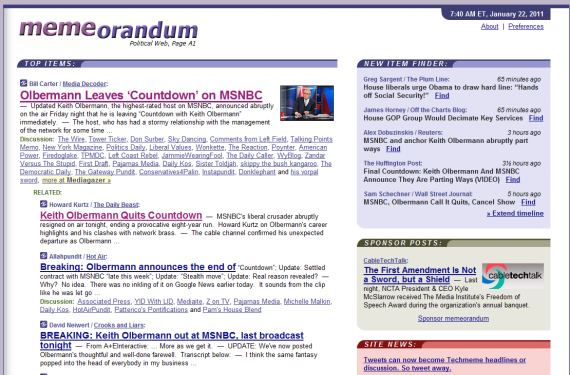Memes
Didn't we just talk about this?
In the old days, back before every man, woman, and child was obligated to record their every thought and movement on the Internet and “media” was something left to the professionals, there was something called the “bandwagon effect.” Basically, when the New York Times judged something to be big news, it was sure to be covered by all the local papers and the three nightly newscasts. And a given story might dominate coverage for days, until the next big thing came along.
Sometimes, these things were obvious. When President Reagan was shot, the Challenger exploded during take-off, or the Berlin Wall came down, every editor and producer knew instinctively that these demanded wall-to-wall coverage. But, more often than not, it was some local niche story of no real national importance that somehow captured the imagination. A baby is trapped in a well! A child beauty queen has been killed! The intern of a Congressman is missing!
The same phenomenon continues today but, because media is ubiquitous, the process is different. Videos and “memes” are generated by people you’ve never heard of bubble up through the blogs, Twitter, Facebook, YouTube, or whathaveyou. Sometimes within minutes, sometimes not for days and weeks, somebody with an audience notices and passes it on.
A fellow most readers have never heard of, Gabe Rivera, has spent the last several years developing a cottage industry of aggregating these. Political bloggers all peruse memeorandum (“Political Web, Page A1”). Coders and gadget freaks keep up with Techmeme (“Tech news essentials”). There’s also Mediagazer (“Must-read media news”) and WeSmirch (“Celebrity news and gossip”). The rise of aggregators of this sort artificially speeds up the process and, occasionally, generates minor memes around things that might not have spread otherwise.
Regardless of how it happens, though, the result is the same: Everyone in a given niche winds up feeling obligated to weigh in. Indeed, I frequently see a headline or story somewhere, decide it’s not worth my time, and then get drawn into it hours later when I see conversations about it on Twitter or my blog feed reader. Sometimes, it’s just a function of “well, this must be important so let me say something.” More often, it’s because, while the particular item itself doesn’t interest me, some aspect of it that’s being talked about does.
All this manifests itself in topics getting beaten like a rented mule. Or a redheaded stepchild. Or a dead horse.
The most recent example of this has been the debate, spawned by the Tucson shootings apparently targeting Rep. Gabby Giffords, over whether the national debate is too caustic. There must have been a dozen postings on variations of that theme here at OTB in the span of less than a week. While overall I think they were a worthwhile contribution to the national debate. But, spawned as they were organically, as ideas occurred to individual contributors here, there was doubtless substantial repetition and overlap.
Similarly, the announcement just before the Thanksgiving holidays that the Transportation Security Agency was introducing particularly invasive scanners at some of our nation’s airports, coupled with an Astroturf campaign to boycott said scanners and several incidents in which TSA employees acted stupidly, led to a national frenzy in which the topic seemed to be all any of the news outlets and blogs were talking about.
And, of course, the meme that won’t go away is Sarah Palin. For a variety of reasons, her announcement as John McCain’s running mate ignited a conversation that hasn’t stopped now in two-and-a-half years. Partly, it’s because she was, in the words of Bob Dylan, a complete unknown who emerged as a national celebrity in an instant. Partly, it’s because she’s an almost perfect litmus test for so many issues that divide the country. Partly, it’s because many people think she has a decent chance of becoming President of the United States. Mostly, it’s because she is perhaps the most amazing publicity machine in the history of the planet.
Ironically, annoyance with Palin as a meme has now become a meme. WaPo’s Dana Milbank is trying to get everyone to take the Palin pledge, promising not to talk about Palin for a month. Not only will this guarantee that we talk about not talking about Palin — thus, of course, talking about Palin! — but it will almost certainly not result in us talking less about Palin in February. Mostly, because there’s no story that doesn’t somehow become about Palin. (Six people shot in Tucson! Is it Palin’s fault?! Even suggesting it is blood libel!)
The nature of 24/7 cable news networks, blogs, Twitter and other non-scripted coverage is that it’s sporadic, highly driven by the developments of the moment, and tends to be repetitive. I’m always amused when I visit my mom, who watches Fox News for hours on end, complain that they talk about the same thing over and over. But, of course, there’s only so much to talk about! And most people watching drop in and out, so the fact that the exact same story was on last hour doesn’t bother them.
To a lesser extent, the same is true at OTB. While I write with regular readers — and especially regular commenters — in mind, the fact of the matter is that the vast majority of people reading any given post have little to no familiarity with the unfolding conversation here. Indeed, a substantial portion of them have no idea that they’re even at a blog; a website is a website for the vast majority of Internet uses. Recognizing that means that posts need to at least partially set the stage with our overall perspective on an issue, since most readers will only have that one post to understand the point being made.






Dawkins coined “meme” to describe something very old … “Dawkins used the term to refer to any cultural entity that an observer might consider a replicator.”
There were replicators in the telegraph and newspaper age, heck, there were replicators in the campfire and myth age. But there is no doubt that the internets speed and aggregate them.
I’m sure there can be bad cycles, but Tuscon wasn’t really that. We got through it all in what, 2 weeks? With an outcome that we should try for civility?
That’s kind of a meme-network success.
@jp: Yeah, I think we’ve just sped up an old process. It’s easier for trivial crap to go viral now than ever, but also easier for voices that never would have been heard before to get their say.
Tuscon mostly yielded good conversations. But it did drag Palin back into things. Maybe for the good, though, if more people decide that her particular brand of “Us vs. Them” discourse isn’t what we need in our national leaders.
Post on Latin America (as I do) and I guarantee you nobody will meme it.
Has the misspelling of Tucson become a meme?
Mr. P, one wag of a commenter somewhere said that the definitive thing we learned from events in Arizona is that 80 percent of people in the US can’t spell Tucson correctly.
And it is a weird spelling, defying the common rule.
I must have missed something somewhere. Although I didn’t think it was much of a success, I didn’t think the calls to boycott the TSA scanners was astroturfed. Isn’t an astroturf campaign usually mounted by someone (a group, company, party, or whatnot) who is trying to hide their role in financing said campaign? Who was trying to hide?
Jack: The “National Opt-Out Day” effort was organized top-down,not bottom-up. They got great coverage and the public reaction was real.
<<<The “National Opt-Out Day” effort was organized top-down,not bottom-up. They got great coverage and the public reaction was real.<<<<<
Except that when the day came nobody "opted out"…
Ms. Gore, you are correct. In the old Spanish name the “c” was pronounced and there is an accent over the “o” but the Anglecized version dropped the hard “c”, it’s easier to pronounce. I used to live in a small Colorado town named Buena Vista, the local Anglos pronounced it Byoona Vista, God help us all.
So that’s the reason for the odd spelling. I didn’t know. Thank you, Mr. Prosser.
Isn’t a blog essentially a meme replicator and extender most of the time? A blog often has a “supermeme’ as its theme or thrust, such as a political slant. So we have memes within memes within memes to the point that it becomes difficult to jump out of the regression. Buy into a meme, and you may be buying into its higher order memes, perhaps unwittingly, or perhaps wholeheartedly. The denegrate Sarah Palin syndrome appears to be one of those, where at the top of the meme chain is perhaps the liberal meme itself.
Yeah, but isn’t the hope that the meme about not talking about Ms. P will have burned itself out by Feb 1? Not entirely unreasonable.
@Mr. Posser:
Kinda like folks who try to pronounce La Jolla “La Joe-La”
Cairo(Kay-row) Illinois, is properly pronounced differently from Cairo, Egypt.
La Jolla, may well be more appropriate than “La Joe-La” though.
I’ve been there … funny story, at the end of the bike ride I say “wow, there are cactus spines in my tires … WOW there are cactus spines in my LEG!” But the chile rellenos were good.
But I am a haphazard speller at best.